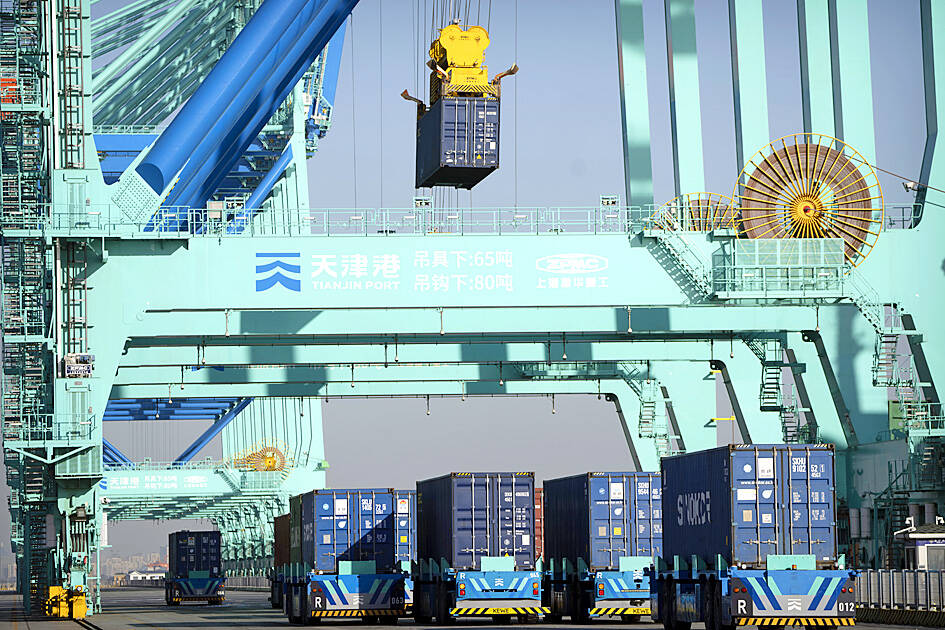China’s imports contracted sharply last month, while exports rose at a slower pace, reinforcing signs of feeble domestic demand despite the lifting of COVID-19 curbs and heaping pressure on an economy already struggling in the face of cooling global growth.
China’s economy grew faster than expected in the first quarter of this year thanks to robust services consumption, but factory output has lagged and the latest trade numbers point to a long road to regaining pre-COVID-19 momentum.
Inbound shipments to the world’s second-largest economy fell 7.9 percent year-on-year, extending the 1.4 percent decline seen a month earlier, while exports grew 8.5 percent, easing from the 14.8 percent surge in March, customs data showed yesterday.

Photo: AP
Economists in a Reuters poll had predicted no growth in imports and an 8 percent increase in exports.
“Given the gloomy outlook for external demand, we think exports will decline further before bottoming out later this year,” Capital Economics Ltd economist Zichun Huang (黃子春) said in a note.
“We still think reopening rebound in domestic demand will drive a recovery in imports over the coming months,” she added.
The downturn in imports suggests that the global economy is unlikely to be able to count much on China’s domestic engine of growth, and as the nation re-exports some of its imports, it also reinforces the extent of weakness in some of its major trading partner economies.
Analysts say the sharp global monetary policy tightening campaign of the past 12 to 18 months and recent Western banking stress remain concerns for the revival prospects of China and the world.
Shipment growth to ASEAN, China’s largest export partner, slowed to 4.5 percent last month from 35.4 percent in March.
Other data showed that South Korean exports to China, a leading indicator of China’s imports, were down 26.5 percent last month, continuing 10 consecutive months of decline.
China’s coal imports fell last month from a 15-month high the prior month, while imports of copper — a proxy for global growth — and natural gas were also down in the same period.
“The contraction of imports may be partly driven by the slowdown of global demand, which in turn affects China’s imports of parts and components for the processing of exports,” Pinpoint Asset Management Ltd (保銀私募基金管理) chief economist Zhiwei Zhang (張智威) said.
The official manufacturing purchasing managers’ index for last month showed new export orders contracting sharply, underlining the challenge facing Chinese policymakers and businesses hoping for a robust post-COVID-19 economic recovery.

NEW IDENTITY: Known for its software, India has expanded into hardware, with its semiconductor industry growing from US$38bn in 2023 to US$45bn to US$50bn India on Saturday inaugurated its first semiconductor assembly and test facility, a milestone in the government’s push to reduce dependence on foreign chipmakers and stake a claim in a sector dominated by China. Indian Prime Minister Narendra Modi opened US firm Micron Technology Inc’s semiconductor assembly, test and packaging unit in his home state of Gujarat, hailing the “dawn of a new era” for India’s technology ambitions. “When young Indians look back in the future, they will see this decade as the turning point in our tech future,” Modi told the event, which was broadcast on his YouTube channel. The plant would convert

‘SEISMIC SHIFT’: The researcher forecast there would be about 1.1 billion mobile shipments this year, down from 1.26 billion the prior year and erasing years of gains The global smartphone market is expected to contract 12.9 percent this year due to the unprecedented memorychip shortage, marking “a crisis like no other,” researcher International Data Corp (IDC) said. The new forecast, a dramatic revision down from earlier estimates, gives the latest accounting of the ongoing memory crunch that is affecting every corner of the electronics industry. The demand for advanced memory to power artificial intelligence (AI) tasks has drained global supply until well into next year and jeopardizes the business model of many smartphone makers. IDC forecast about 1.1 billion mobile shipments this year, down from 1.26 billion the prior

People stand in a Pokemon store in Tokyo on Thursday. One of the world highest-grossing franchises is celebrated its 30th anniversary yesterday.

Zimbabwe’s ban on raw lithium exports is forcing Chinese miners to rethink their strategy, speeding up plans to process the metal locally instead of shipping it to China’s vast rechargeable battery industry. The country is Africa’s largest lithium producer and has one of the world’s largest reserves, according to the US Geological Survey (USGS). Zimbabwe already banned the export of lithium ore in 2022 and last year announced it would halt exports of lithium concentrates from January next year. However, on Wednesday it imposed the ban with immediate effect, leaving unclear what the lithium mining sector would do in the